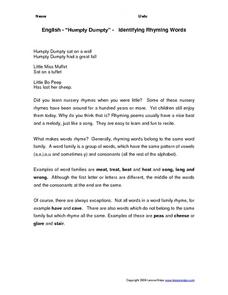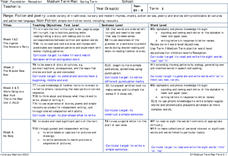Curated OER
Valentine's Day Poems
Roses are red, violets are blue, poems are sweet, and educational too.
Curated OER
Teaching Phonics Through Poetry
Students understand rhythm and rhyming words in poetry. In this poetry lesson, students listen to poetry and are able to find the ABAB pattern. Students recognize the "ow" sound. Students complete various activities to practice the...
Curated OER
English--"Humpty Dumpty"--Identifying Rhyming Words
In this rhyming words worksheet, students read Humpty Dumpty and begin recognizing rhyming words. Students unmix a mixed up batch of words by putting the words in 3 word family columns and list each one underneath one of the families....
Curated OER
Mouse Mess
Scholars practice rhyming and phonemic awareness using trade books and poetry. They will listen to the book Mouse Mess several times throughout the week, identifying rhyming words, and matching words that begin with the same sound. Then...
Curated OER
Poetry in Motion
Pupils explore poetry and technology. In this poetry writing lesson, students choose a theme and write a pattern poem, then create a related slideshow.
K12 Reader
Will You Stay and Play?
Start off your day with a study of -ay words. Pupils can practice long a with -ay words by reading the brief poem included here. After they read, class members answer three reading comprehension questions right on the page.
K12 Reader
The Man Has a Can
Add this -an word resource into your plan for the day! Kids can read the poem, which includes several -an words to practice with, and then answer the three included reading comprehension questions.
K12 Reader
The Thin Pin Can Spin
Words that end with -in are the focus on this learning exercise. Learners read a short poem that includes quite a few -in words to identify and practice and then answer three reading comprehension questions.
K12 Reader
The Spy Will Try Not to Cry
Learn all about the exploits of a sly spy from the short poem included on this resource. The poem, intended to provide practice with long /i/ words that use the letter y, is paired with three reading comprehension questions for pupils to...
K12 Reader
The Snow Blows
Brrr! It's cold outside when it snows. Have your class read this poem about the snow to practice the long /o/ sound, -ow words, and reading comprehension. After reading, they respond to three questions.
K12 Reader
Snack in the Sack
Get those -ack words straight with a quick exercise. Class members read a short poem that includes quite a few -ack words and then complete three reading comprehension questions.
K12 Reader
The Big Pig
Pigs are often big, but what else can your class find out about this particular pig? They'll learn a few things about it by reading the poem full of -ig words, and then answering the three reading comprehension questions.
K12 Reader
Drop the Mop!
Combine a study of -op words with a bit of reading comprehension. Learners read a quick a silly poem containing many -op words and then answer three questions.
K12 Reader
A Job for Bob
Get a handle on -ob words with a quick exercise. Learners first read a brief poem made up with many -ob words. They then response to three reading comprehension questions that are included on the page.
K12 Reader
Shut the Hut
Go with your gut and try out this worksheet that focuses on -ut words! Learners read a brief poem that includes many different words that end in -ut and then respond to three reading comprehension questions.
Poetry4kids
Rhyme Schemes Lesson Plan
Scholars read four brief poems and analyze their word usage in order to identify the rhyme scheme.
Curated OER
Epic Poetry: Literary Terms for Story Analysis
What do Star Wars, Indiana Jones, and The Odyssey have in common? Why, they are all epics, of course, and are presented here as examples of the literary term. If you are beginning a study of epics, consider previewing the terms included...
Curated OER
Alliteration
In this alliteration worksheet, 4th graders write alliterations with their first names, find rhyming patterns in poems, and more. Students complete 4 activities.
K12 Reader
The Brown Cow in the Tower
Move toward mastery of -ow words with a quick worksheet. Learners read a poem that includes as many -ow words as possible and then respond to three included reading comprehension questions.
Curated OER
Fiction and Poetry
Pupils explore fictional text and poetry. They explore the story structures used in the types of texts and examine the language patterns used. Students practice tracking text in the correct manner.
Curated OER
Pattern Detectives
Students discover patterns in language, math and science. They experience patterns by hearing stories, and becoming pattern detectives.
Curated OER
Buggy Patterns
First graders discuss the definition of patterns, and sing the song, Going Buggy, identifying patterns in the song. They create original patterns using bug counters and insect stickers.
Curated OER
Rhyming Words
In this rhyming words worksheet, 4th graders complete activities such as circling rhyming words, writing rhyming words, and more. Students complete 6 activities.
Curated OER
An Irritiating Creature - a poetry lesson
Students think about and evaluate the meaning of a poem. It also encourages students to be original and creative in their thinking as they read, analyze and illustrate their story.

























